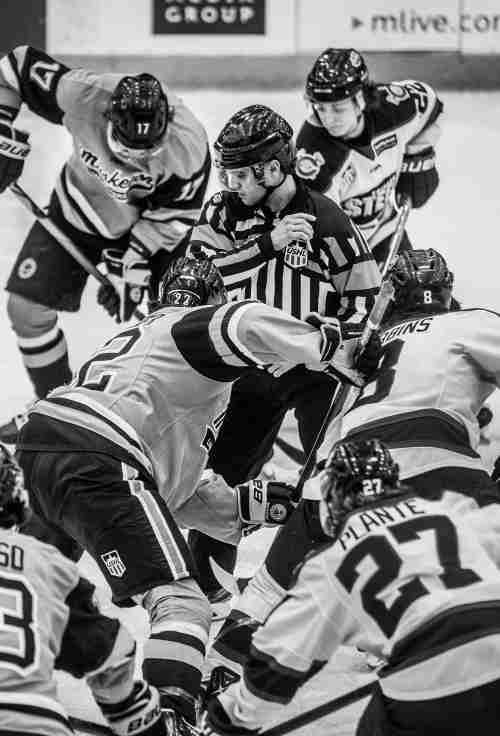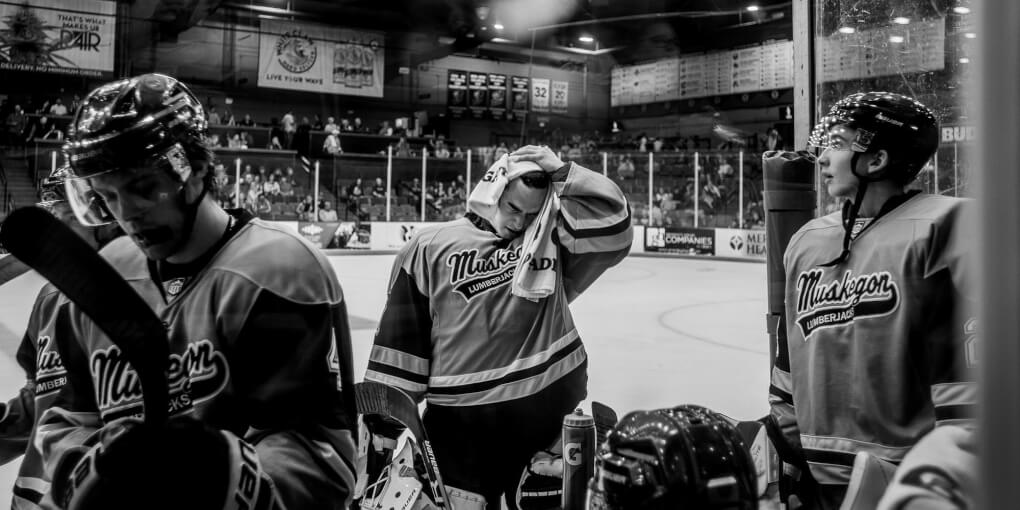In a lower-level arena room, elite hockey players with big aspirations to play at the collegiate level or in the National Hockey League were in small groups, each working on building a house of 20 cards.
The activity should be calm, in theory. But the drive that propels athletes at this level to succeed doesn't stay on the ice. This was competitive house-of-cards building, and players, at times frustrated when their cards fell, were keeping tabs on how other groups were faring.


Players Jake Braccini, left, and Jake Richard work together on an exercise to build a house of cards.
Looking at the success of another group, a player announced to his card-building team: "They got all 20. Should we just R-3 it?"
R-3 stands for relax, regroup and refocus. Minutes earlier, Victoria Fogel, senior part-time psychology professor in the College of Liberal Arts and Sciences, had talked to the group of players after practice about this approach to keeping negative thoughts from snowballing and impeding their performance.
Fogel explained that anxiety makes it hard to think clearly, and said deep belly breathing allows players to relax. Fogel then advised them to say to themselves a statement: Leave the past behind. Refocus on what you can do now.
This is helpful after a frustrating shift on the ice, while sitting on the bench, in the locker room or any other time negative thoughts threaten to derail performance, Fogel said.
That day's exercise using cards was designed to foster healthy communication with teammates and learn how to work through frustration.

Hockey players prepare for a face off, official Sean Fernandez is at center.
Giving hockey players an edge
Fogel brought her expertise in applied behavior analysis, a science that analyzes the effects of environmental factors on human behavior, to the Muskegon Lumberjacks for the 2021-2022 season. Grand Valley students assisted her by also working with players.
A focus of her applied behavior analysis expertise is sports performance, which deals with everything from setting goals to pushing through negativity to practicing self-care to identifying impediments to skill development, she said.
Fogel is also looking to expand this work by connecting with the GVSU men's and women's tennis teams. Fogel provided initial training on self-talk with the Lakers, and she said she is working with coach Samantha Schall to determine how to meet the teams' needs for next season.
Lumberjacks officials connected with Fogel so she could help players navigate a unique stage in their development by working with them, particularly from a mental training standpoint.
The Lumberjacks are members of the United States Hockey League, described as "the nation's only Tier I junior hockey league and leading producer of NCAA players and National Hockey League draft picks in the United States."
"Our guys are young, 16 to 20 years old," said Mike Hamilton, Lumberjacks coach. "They've moved away from their families to chase their dreams and live in Muskegon, and they're by themselves. They're learning to manage life, school, a hockey schedule and life's ups and downs."
On top of that, they are under tremendous pressure to show they are ready for the next level, Hamilton said. There are NHL or college scouts at nearly every game. There are worries about getting traded.
"Every decision they make has an impact on them," Hamilton said. "Every step they take and every time they react is scrutinized, whether it's something positive or, if they make a mistake and come back and slam their stick, someone may make a note saying they don't react well."
Fogel noted that one outcome of moving to the next level with the Lumberjacks is that some players who were the top athlete in their previous programs are "no longer the top athlete on this team." Self-confidence can wane in the face of that reality.
The work she and students do with the players involves both group exercises such as the house-of-cards activity as well as setting individualized goals and developing strategies to make progress. The GVSU students did individual breakout sessions with players assigned to them for the season.
"Some players wanted to address lack of sleep, or improving skills. Some players have negative thoughts impacting their performance," Fogel said. "We really let the players rank order their goals."
Hamilton said he has seen the benefit of the work by Fogel and the students, especially when the team was going through a batch of losses early in the season.
"We can't measure the value of how good this is for our guys, to be able to step back and learn the world is not crumbling around you," Hamilton said. "This program has helped them take a step back to learn from the situation and let it go."

Lumberjack Gavin Reed throws his arms up in frustration while attempting to build a house of cards with his teammates.
Setting goals to score goals, and more
One of the more active and animated players during the card-building exercise was Ben Strinden, who would express competitive frustration when his team's house of cards collapsed, but then would quickly suggest his team deploy the R-3 approach.
Strinden said later that he came into the season with specific goals for scoring statistics and has found that the GVSU program has helped him with positive self-talk and telling himself he is going to make an impact.
"Throughout the season — it's super long — there are a lot of ups and downs naturally so finding these different ways to get through it is good," Strinden said.
As they talked about R-3 after the house of cards activity, Parker Lindauer questioned how players could go through all of the steps in a fast-moving game situation. Fogel told Lindauer she welcomed the question and talked about ways to modify the R-3 approach to achieve the goal of the mental strategy, such as reducing the depth of breaths.
"If you are feeling too much anxiety or anger, you are not going to execute at the top level," Fogel added.

For the GVSU students helping players with individual goals, building a rapport with the players and seeing their progress has been gratifying.
Alex Riedel '22, who studied criminal justice and psychology at GVSU, said it was interesting to note the athletes' deepening understanding of how important the mental aspect of their game is.
Riedel concentrated on getting to know each player as a person, which helped some overcome reluctance to talk about their thoughts while also sharpening for everyone their goals and their strategies for attaining them.
"This is honestly one of the best experiences I have had. It has helped me get into the different realms of psychology and utilize what I have learned," Riedel said.
Kaimen Allen said this work has provided crucial training for career goals centered around working with sports performance. Allen's time at GVSU has involved studying exercise science and psychology.
The broad spectrum of players and their experiences provides different challenges and opportunities, Allen said. For instance, an athlete getting a lot of playing time may feel more confident as opposed to a player who is striving to gain more minutes.
But all players can benefit from this work, said Allen, adding that discovering the approach that individually works best for players has enhanced learning.
"Being able to meet with players one on one helps build confidence for your future," Allen said. "It's an awesome experience, and the reason why is because of how it's structured by Victoria."
Fogel said the students acquired capabilities such as learning how to be flexible and adapt within work environments, dealing with sometimes difficult situations like trades, building a rapport and credibility with players and working with athletes from a wide range of backgrounds.
"I'm glad that they're getting this valuable professional experience, which is part of a quality education," Fogel said.







